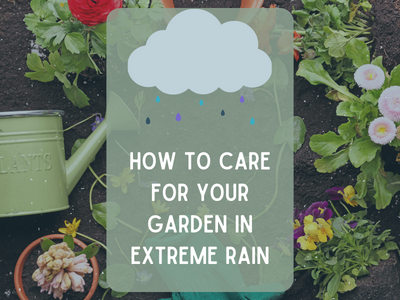How To Care For Your Garden In Extreme Rain
#1- Improve Drainage
Ensure that your garden has proper drainage by incorporating organic matter like compost or well-rotted manure into the soil. This helps to improve soil structure and drainage capacity. If your garden has poor drainage, consider installing French drains or raised beds to prevent waterlogging.
#2-Avoid Overwatering
While it may be tempting to water your plants during heavy rain, it’s important to monitor soil moisture levels and avoid overwatering. Excessive water can suffocate plant roots and promote disease. Use a rain gauge or simply observe the condition of the soil to determine if additional watering is necessary.
#3- Mulch Wisely
Mulching can help regulate soil moisture levels and prevent erosion during heavy rain. However, be mindful of the type and depth of mulch you use. Avoid using thick layers of organic mulch that can trap moisture excessively. Instead, opt for a thin layer of mulch to maintain moisture balance and minimize the risk of fungal diseases.
#3-Prevent Soil Erosion
Heavy rain can cause soil erosion, which can damage plant roots and wash away valuable topsoil. Implement erosion control measures such as using retaining walls, terracing, or planting groundcover plants that have extensive root systems to stabilize the soil.
#4-Inspect For Drainage Issues
Regularly check your garden for any drainage issues that may arise during extreme rain. Look for standing water or areas where water accumulates. These areas may need additional attention, such as creating channels or redirecting water flow to prevent damage to your plants.
#5-Prune & Stake Plants
Trim any damaged or weak branches from trees and shrubs to minimize the risk of breakage during heavy rain and strong winds. Stake taller plants to provide extra support and prevent them from falling or bending under the weight of the rain.
#6- Monitor For Diseases & Pests
Excessive moisture can lead to increased susceptibility to diseases and pests. Keep an eye out for signs of fungal diseases, such as leaf spots or powdery mildew. If necessary, apply appropriate organic or chemical treatments to prevent the spread of disease.
#7-Provide Proper Ventilation
If your plants are grown in a greenhouse or covered area, ensure adequate ventilation to prevent high humidity levels and promote air circulation. This helps to reduce the risk of fungal diseases caused by prolonged moisture.
#8- Remove Debris
After heavy rain, check your garden for any debris or fallen branches that may have accumulated. Remove them promptly to prevent potential damage to plants and to maintain a clean garden environment.
#9-Be Patient
Remember that plants have a remarkable ability to recover from extreme weather conditions. In most cases, they will bounce back given the right care and time. Be patient and provide the necessary care to support their recovery.
In Conclusion
If you are in need of landscaping maintenance or design assistance, contact us. If you are seeking to enhance the beauty and functionality of their outdoor spaces, we are here for you. Whether you are a homeowner, a business owner, or a property manager, investing in professional landscaping services can offer numerous benefits.

